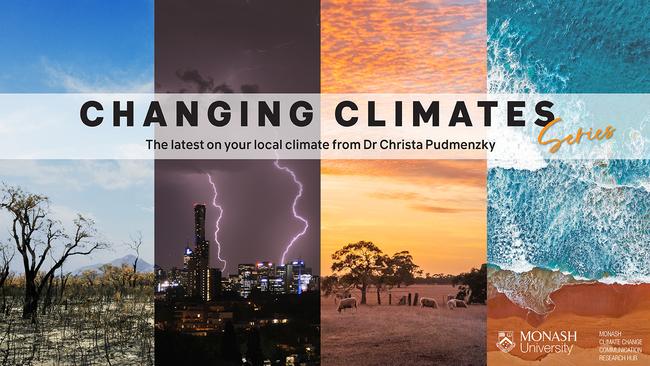Carbon having a ripple effect on our oceans and economy
The economic impacts of emissions on our oceans are beginning to surface. Host of the Changing Climates series, Dr Christa Pudmenzky, takes a deep dive and explains how.

HyperLocal
Don't miss out on the headlines from HyperLocal. Followed categories will be added to My News.
Living on the world's largest island, Aussies are no strangers to the ocean.
Our seas provide stunning coral reefs for snorkelling, delicious seafood, and make a significant contribution to our economy.
In fact, the ocean plays such an important role in supporting life on land that we have a term to describe it: the blue economy.
'Blue economy' refers to the economic activities associated with our oceans and seas – such as tourism, food, health and energy – and focuses on the sustainable use of ocean resources.
Between 2020 and 2021, Australia's blue economy generated almost $120 billion and supported around half a million jobs.
However, our oceans need the right set of conditions to thrive, and the excessive burning of fossil fuels and resulting greenhouse gas emissions is starting to throw out this balance.
Since the industrial revolution, the amount of carbon dioxide in our atmosphere has increased and caused temperatures around the globe to rise.
We've seen this here on the Gold Coast, where the coldest October day is now 2.4C warmer than 30 years ago.

Turning sour
The ocean is perhaps our greatest ally against climate change, soaking up large amounts of carbon dioxide.
In fact, over the last 200 years, oceans have absorbed more than 150 billion metric tons of carbon dioxide – around 30 times the weight of the Great Pyramid of Giza.
However, carbon dioxide is an acidic gas.
This means that although our oceans do a great job of taking it in, it lowers the pH level of the water and makes it more acidic.
It's just like if we added vinegar to a glass of water.
This process is known as ocean acidification and can have all sorts of consequences for us and our sea life.

Something's fishy
Australia's fishing industry hauls in around $3.5 billion every year.
However, ocean acidification is starting to turn the tide on this bountiful catch, with acidity having already increased between 26 and 30 per cent since the 1880's.
And a further increase in acidity of 20 to 120 per cent is possible within the next 15 years.
When fish take in acidic water, it can change the pH level of their blood and affect their ability to grow and reproduce.
This has flow-on effects for fish populations, the 17,000 people employed in the industry, and of course, consumers.
In 2020-21 Aussies consumed over 350,000 tonnes of seafood, around 40 times the weight of the Eiffel Tower.
And as our population grows, this demand is only set to rise.
Crumbling coral
Tourism isn't off the hook either.
People flock from all over the globe to snorkel amongst Australia's colourful underwater gardens.
The Great Barrier Reef alone draws in more than two million tourists, supports over 60,000 jobs, and contributes $5.7 billion to our economy every year.
But, with oceans becoming more acidic, the industry may start to dissolve.
Many sea creatures such as oysters, lobsters, shrimp and coral have skeletons or shells made from calcium carbonate.
In more acidic conditions these hard structures are unable to form and may even dissolve.
It's like adding lemon juice to a stick of chalk – the acidic lemon reacts with the chalk and causes it to break down.
Currently, the pH level of Aussie oceans sits around 8.
However, if it drops below 7.8, coral reefs will cease to grow, leaving tourism high and dry.
Reeling it in
There are lots of things we can do to keep our blue economy out of sea-rious trouble.
Jumping ship from fossil fuels, and switching to renewable energy is the best way to reduce emissions and limit the amount of carbon dioxide our oceans absorb.
Riding the wave of public transport is also a great option and helps to reduce our carbon footprint.
Finally, keeping our sea life and coral reefs safe by following sustainable fishing and tourism practices will keep our oceans healthy for generations to come.
Together we can wade through the waters of ocean acidification and keep Australia's blue economy afloat.
Want more information on how your climate is changing? Check out the last article in this series.
Dr Christa Pudmenzky is a climate scientist at the University of Southern Queensland.
This column is part of a collaboration between Monash University and News Corp to deliver hyperlocal weather and climate information.


